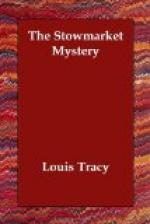“But you believed me guilty?”
The barrister looked his questioner straight in the eyes. He saw there the glistening terror of a tortured soul. Somehow he expected to find a different expression. He was puzzled.
“Why have you come here, Mr. Hume?” he abruptly demanded.
“To implore your assistance. They tell me you are the one man in the world able to clear my name from the stain of crime. Will you do it?”
Again their eyes met. Hume was fighting now, fighting for all that a man holds dear. He did not plead. He only demanded his rights. Born a few centuries earlier, he would have enforced them with cold steel.
“Come, Mr. Brett,” he almost shouted. “If you are as good a judge of men as you say I am of tobacco, you will not think that the cowardly murderer who struck down my cousin would come to you, of all others, and reopen the story of a crime closed unwillingly by the law.”
Brett could, on occasion, exhibit an obstinate determination not to be drawn into expressing an opinion. His visitor’s masterful manner annoyed him. Hume, metaphorically speaking, took him by the throat and compelled his services. He rebelled against this species of compulsion, but mere politeness required some display of courteous tolerance.
“It seems to me,” he said, “that we are beginning at the end. I may not be able to help you. What are the facts?”
The stranger was so agitated that he could not reply. Self-restrained men are not ready with language. Their thoughts may be fiery as bottled vitriol, but they keep the cork in. The barrister allowed for this drawback. His sympathies were aroused, and they overcame his slight resentment.
“Try another cigarette,” he said, “I have here a summary of the evidence. I will read it to you. Do not interrupt. Follow the details closely, and correct anything that is wrong when I have ended.”
Hume was still volcanic, but he took the proffered box.
“Ah,” cried Brett, “though you are angry, your judgment is sound. Now listen!”
Then he read the following statement, prepared by himself in an idle moment:—
“The Stowmarket Mystery is a strange mixture of the real and the unreal. Sir Alan Hume-Frazer, fourth baronet, met his death on the hunting-field. His horse blundered at a brook and the rider was impaled on a hidden stake, placed in the stream by his own orders to prevent poachers from netting trout. His wife, nee Somers, a Bristol family, had pre-deceased him.
“There were two children, a daughter, Margaret, aged twenty-five, and a son, Alan, aged twenty-three. By his will, Sir Alan left all his real and personal estate to his son, with a life charge of L1,000 per annum for the daughter. As he was a very wealthy man, almost a millionaire, the provision for his daughter was niggardly, which might be accounted for by the fact that the girl, several years before her father’s death, quarrelled with him and left home, residing in London and in Florence. Both children, by the way, were born in Italy, where Sir Alan met and married Miss Somers.




